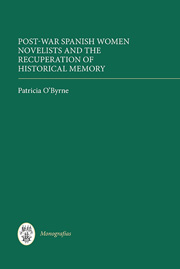Book contents
- Frontmatter
- Dedication
- Contents
- Acknowledgements
- Preface
- Introduction
- 1 Spanish Women Novelists 1940–1960
- 2 Work and Religion: a Right-wing Perspective
- 3 Sexual Abuse and Male Dominion
- 4 Spinsters in Post-war Spain
- 5 Exemplary Mothers and Sexually Liberated Women
- 6 Prostitution, Sexual Ignorance and Sex Outside Marriage
- Afterword
- Works Cited
- Index
Preface
Published online by Cambridge University Press: 05 August 2014
- Frontmatter
- Dedication
- Contents
- Acknowledgements
- Preface
- Introduction
- 1 Spanish Women Novelists 1940–1960
- 2 Work and Religion: a Right-wing Perspective
- 3 Sexual Abuse and Male Dominion
- 4 Spinsters in Post-war Spain
- 5 Exemplary Mothers and Sexually Liberated Women
- 6 Prostitution, Sexual Ignorance and Sex Outside Marriage
- Afterword
- Works Cited
- Index
Summary
The Spanish Civil War (1936–1939) heralded a new age of violence and warfare in Europe which would shape much of the continent's mid-twentieth-century history. It is estimated that 500,000 people lost their life during this war and a further 100,000 in the aftermath.
Franco's victory over Spain's Second Republic marked the end of the Civil War but not of the violence. Franco initiated a relentless, ruthless and brutal campaign to eradicate left-wing Republicans and Republicanism from Spanish society. The regime, evoking the former glory of the Spanish empire and presenting itself as the guardian of the nation's secure future, promoted conservative political, societal and family values. The imposition of Franco's vision saw tens of thousands of his compatriots executed or perish behind bars. The war and its aftermath was portrayed by the victors as an epic battle of good against evil, the winners as heroes, the losers as villains. The media were reduced to a propaganda machine of the regime.
Almost seventy years after the end of the Civil War and just over thirty years after the death of General Franco, Spain officially confronted its past for the first time, passing the Ley de Memoria Histórica (2007) (Law of Historical Memory), which recognised the need not only to recover the missing dead but to reassess the historical facts and the political discourse relating to the Civil War and the dictatorship years.
- Type
- Chapter
- Information
- Publisher: Boydell & BrewerPrint publication year: 2014

